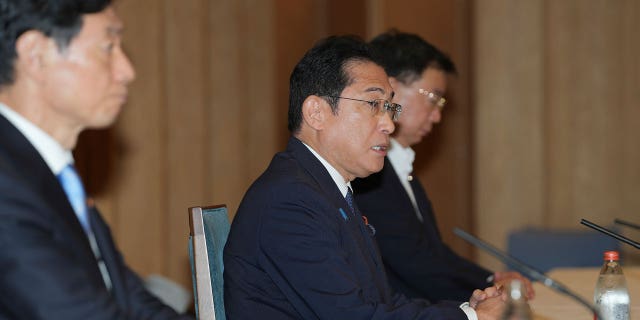- In 2011, a destructive earthquake and tsunami caused three nuclear reactors to melt and contaminate cooling water in Fukushima, Japan.
- Japan’s plan to release the treated radioactive wastewater into the Pacific Ocean has received backlash from local fishing groups and neighboring countries.
- The Japanese government has pledged to protect the country’s fishing communities following fears that the nuclear waste release would ruin the industry’s reputation.
Japanese Prime Minister Fumio Kishida on Monday promised his government’s full support for fishing communities during the decades-long process to release treated radioactive wastewater from the wrecked Fukushima nuclear plant into the sea.
Meeting with fisheries representatives, Kishida promised measures to protect the fishing industry’s reputation until the release ends.
Masanobu Sakamoto, head of the National Federation of Fisheries Cooperatives, reiterated his organization’s opposition to the release. He said members of the fishing community have gained some confidence about the safety of the move, but that they still fear damage to their industry, and welcomed the government pledge for support.
CHINA CONDEMNS JAPAN’S PLAN TO RELEASE FUKUSHIMA’S RADIOACTIVE WASTEWATER INTO THE SEA
“Scientific safety and the sense of safety are different,” Sakamoto said. “Even if it’s safe, reputational damage occurs.”
Kishida later told reporters that Sakamoto’s response signaled improved understanding and that key Cabinet ministers will meet Tuesday to set a date to start the release. Japan’s national broadcaster NHK said the government hopes it could begin as early as Thursday.
Sakamoto welcomed the government pledge for its long-term support for the fisheries and sought additional funding as needed. The government has offered funding totaling $550 million for sales promotion and other steps, and for sustainable fishing operations.

Japanese Prime Minister Fumio Kishida, center, speaks during a meeting in Tokyo on Aug. 21, 2023. Japanese government officials have pledged to support the livelihoods of fisheries throughout the decades-long process of releasing treated radioactive wastewater from the country’s wrecked Fukushima nuclear plant into the sea. (Zhang Xiaoyu/Pool Photo via AP)
The easing of opposition from the fishing industry is key to the release because the government promised in 2015 not to start without “understanding” from fishing groups, after past accidental and unapproved discharges.
A massive March 11, 2011, earthquake and tsunami destroyed the Fukushima Daiichi plant’s cooling systems, causing three reactors to melt and contaminating their cooling water. The water is collected, filtered and stored in around 1,000 tanks, which will reach their capacity in early 2024.
Scientists generally agree the environmental impact of treated wastewater would be negligible, but some call for more attention to dozens of low-dose radionuclides that remain in it.
JAPAN’S FUKUSHIMA NUCLEAR PLANT CONDUCTS TESTS TO RELEASE TREATED RADIOACTIVE WASTEWATER INTO SEA
The government announced the release plan in April 2021 and has since faced strong opposition from Japanese fishing organizations, which worry about further damage to the reputation of their seafood as they struggle to recover from the 2011 earthquake, tsunami and nuclear disaster. Groups in South Korea and China have also raised concerns, turning it into a political and diplomatic issue.
The government and the plant operator say the water must be removed to make room for the plant’s decommissioning and to prevent accidental leaks from the tanks. They say all the treated water will be reprocessed until it meets legally releasable levels and then diluted, making it far safer than international standards.
CLICK HERE TO GET THE FOX NEWS APP
The International Atomic Energy Agency, asked for cooperation from Japan to improve transparency and credibility, and in a final report in July concluded that the plan, if conducted as designed, will cause negligible impact on the environment and human health.
The government has also stepped up outreach efforts to explain the plan to neighboring countries, especially South Korea, to keep the issue from interfering with their relationship.
